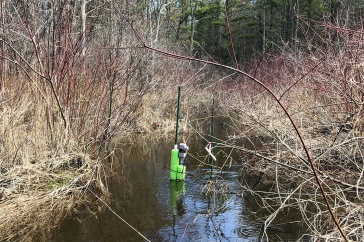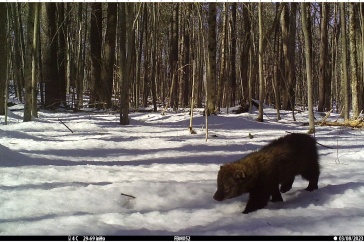
Photomicrograph from the biopsied mass showing a fungal spherule, consistent with Coccidioides, surrounded by inflammatory cells. Credit: NH Veterinary Diagnostic Lab
A pathologist with the New Hampshire Diagnostic Veterinary Lab at the University of New Hampshire recently diagnosed the fungal disease Valley Fever in a rescue dog from Arizona. It is the first time the lab has diagnosed this disease in a dog in the state. The disease, which is treatable, is endemic in the Southwest and rarely seen in native New England dogs.
“This case serves as a reminder to inform your veterinarian of your pet’s travel history and the importance of submitting biopsied tissues for histopathologic examination even if the lesion seems routine. This is especially important given the increased numbers of homeless dogs and cats being transported from southern states to New England for adoption. These animals may be infected with diseases that are endemic in those states but are not normally seen in this region,” said Colleen F. Monahan, senior veterinary pathologist and clinical assistant professor at New Hampshire Veterinary Diagnostic Lab and UNH.
Monahan made the diagnosis after a mass on the leg of a New Hampshire dog, removed by a veterinarian, was submitted to the lab for biopsy. The inflamed mass was found to be the fungal disease Valley Fever, an infection caused by the fungus Coccidioides.
“There are rare reports of people and animals from New England contracting Valley Fever after travelling to a region where it is more prevalent. In this case, we learned from the veterinarian that this dog was rescued from Arizona two years prior and had a small mass on its leg at that time. The mass recently had increased in size, leading to concern from the owner and removal by the veterinarian,” Monahan said.
According to the Valley Fever Center for Excellence at the University of Arizona, two-thirds of U.S. Valley Fever infections are contracted in Arizona even though nationally, the disease is uncommon. People and animals can develop Valley Fever after inhaling spores growing in loose, sandy soils most commonly found in the southwestern United States and northwestern Mexico. The disease is not zoonotic – it cannot be passed from animals to people or between animals.
The most common early symptoms of primary pulmonary Valley Fever in dogs are coughing, fever, weight loss, lack of appetite, and lack of energy, according to the Valley Fever Center for Excellence at the University of Arizona. Most dogs, with adequate antifungal therapy, recover from the disease, especially with early diagnosis and intervention.
“While there are tests that can be run to rule out Valley fever, since it is so rare a diagnosis in this region, screening testing of adopted dogs would be excessive. Instead, owners should inform their veterinarians if their animals were adopted from or traveled to different regions -- especially if the animal is sick -- so the veterinarian can have the whole picture to better diagnose and treat their pet,” Monahan said.
As part of the NH Agricultural Experiment Station at UNH, the New Hampshire Veterinary Diagnostic Laboratory serves the state of New Hampshire as a key partner with the New Hampshire Commissioner of Agriculture and State Veterinarian in their efforts to monitor and control important animal diseases. The lab also provides diagnostic services to hundreds of veterinarians from New Hampshire and New England who use the lab’s histopathology, microbiology, serology, and necropsy services for the diagnosis of animal diseases in pets, farm animals, wildlife, zoo, and marine animals. The lab is committed to the One Health effort, a collaborative, global movement that unites physicians, veterinarians, ecologists, and many other life science professionals in addressing and preventing health threats in people, animals, and the environment.
Founded in 1887, the NH Agricultural Experiment Station at the UNH College of Life Sciences and Agriculture is UNH’s original research center and an elemental component of New Hampshire's land-grant university heritage and mission. We steward federal and state funding, including support from the USDA National Institute of Food and Agriculture, to provide unbiased and objective research concerning diverse aspects of sustainable agriculture and foods, aquaculture, forest management, and related wildlife, natural resources and rural community topics. We maintain the Woodman and Kingman agronomy and horticultural research farms, the Macfarlane Research Greenhouses, the Fairchild Dairy Teaching and Research Center, and the Organic Dairy Research Farm. Additional properties also provide forage, forests and woodlands in direct support to research, teaching, and outreach.
-
Written By:
Lori Wright, '06G | NH Agricultural Experiment Station | lori.wright@unh.edu | 16038621452
















































